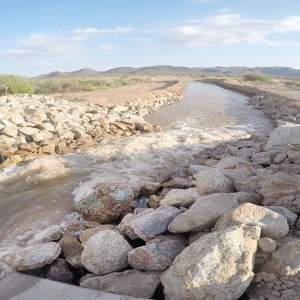The Stream, May 13, 2021: A Sinking Mexico City Could Lead To Groundwater Contamination
YOUR GLOBAL RUNDOWN
- A recent study found Mexico City is sinking rapidly, which could contaminate groundwater.
- A Canadian oil and gas company is illegally disposing of wastewater at a Namibian World Heritage site.
- Heavy rain in parts of West Bengal, India, is flooding Covid-19 hospitals.
- Climate disasters will continue to impact public utilities in the United States.
A new survey finds many cities globally aren’t prepared to finance climate adaptation projects.
“Only a fraction of recovery spending [from the coronavirus pandemic] is being put towards climate change, and even less towards adaptation.” – Kyra Appleby, global director of the Carbon Disclosure Project (CDP). New research from CDP found that 43 percent of 800 cities surveyed around the world did not have a plan to adapt to climate change, the Guardian reports. The survey also found that one in four cities lack funding to implement climate adaptation infrastructure and policies. According to the research, last year 1,142 climate adaptation projects in over 400 cities had yet to be financed.
- Why it matters: It is now clear that even if carbon emissions were to cease immediately — an impossible scenario — the world must still learn to cope with changes in weather patterns and sea levels that are already underway and will continue. It is also clear that the adaptive measures, by and large, will be in response to changes in water availability: to nastier droughts, more powerful floods, and shifts in the timing and quantity of snow, rain, and glacial melt. Water managers have much to think about, and the considerations vary by region. Still, one issue more than any other is likely to dominate the water adaptation discussion in the coming decades: storage.
IN RECENT WATER NEWS
Great Lakes Water Diversions Could Be More Numerous
As the global climate warms and water scarcity mounts, Great Lakes water is more valuable than ever before.
That point was made clear on February 5 when the Village of Somers in Kenosha County, WI applied to the state Department of Natural Resources to divert water from Lake Michigan. The community wants 1.2 million gallons a day, and up to 2 million gallons of water daily in high stress events, in anticipation of future population growth. The application will only need state approval, according to the DNR, since the amount of water is below 5 million gallons per day. Anything more than that would need all states within the Great Lakes basin plus the Canadian provinces Ontario and Quebec to weigh in.
Lake Michigan holds 1.3 quadrillion gallons of water. So the village’s ask is a pittance. But the issue that rankles environmental activists is that, if approved, the Somers application is the fourth Great Lakes water diversion proposal in the past thirteen years.
Extremely Dry Conditions Spill Across the American West
Spring is generally a time of renewal for the watersheds of the western United States.
This year, though, the cycle is in disarray. Outside of the Olympic and Cascade ranges of Washington state, winter snows were subpar. The spring melt has been a dud. From the Klamath to the Colorado and Rio Grande, watersheds are under stress once again, and water managers face difficult tradeoffs between farms, fisheries, and at-home uses. The main thing being renewed is concern over the seeming inadequacy of the region’s water supply.
In Case You Missed It:
On Eve of Line 5 Shutdown Deadline, Enbridge Vows to Defy Michigan Order – Enbridge Energy technically has one more day to shut down the Line 5 pipeline in the Straits of Mackinac, but even the pipeline’s most vocal opponents acknowledge slim odds that the oil actually stops flowing right away. This piece was originally published by Bridge Michigan and Michigan Radio as part of the Great Lakes News Collaborative.
HotSpots H2O: Water and Land Disputes Turn Violent Along Ambiguous Kyrgyz-Tajik Border – Distrust between Kyrgyz and Tajik ethnic groups is exacerbated by extreme water security.
A Canadian Oil And Gas Company in Namibia is Illegally Disposing of Wastewater
The Canadian company ReconAfrica is disposing of wastewater without permits at an oil and gas project in Namibia, National Geographic reports. Locals say the company is also ignoring concerns about the impact of exploration and drilling on water supplies, homes, and animals. Parts of the project lay in the watershed of the Okavango Delta, a UNESCO World Heritage site home to a wide array of wildlife and plants.
TODAY’S TOP WATER STORIES, TOLD IN NUMBERS
50 CENTIMETERS PER YEAR
A study earlier this year found that Mexico City is sinking at a rate of 50 centimeters per year. Nature World News reports that the land subsidence could start to impact infrastructure and water supplies. As the city continues to sink, clay underneath city soil will crack, resulting in contamination within groundwater extraction wells.
102 MM OF RAIN
Heavy rain in Kolkata, India, is flooding hospitals amid the country’s worst coronavirus outbreak. The Free Press Journal reports that as of Tuesday, the Kolkata neighborhood of Alipore had received 102 mm of rainfall. Officials said rain could continue across West Bengal through Wednesday.
ON THE RADAR
A new analysis from Moody’s Investors Service found that climate-induced events like droughts, wildfires and storms will continue to challenge public utilities in the United States, especially water and sewer systems, Market Watch reports. The Moody’s report found that severe climate events will make it harder for ratepayers to afford higher rates needed to restore existing infrastructure.
- Why it matters: In rural America, building, maintaining, and operating a water and sewer system is generally the most expensive item on the budget. As climate change creates increasingly unstable patterns of precipitation and heat across the United States, waves of expat Sun Belters could repopulate cities and towns in Michigan’s Upper Peninsula and Thumb that are contending with pressing infrastructure challenges.
Jane is a Communications Associate for Circle of Blue. She writes The Stream and has covered domestic and international water issues for Circle of Blue. She is a recent graduate of Grand Valley State University, where she studied Multimedia Journalism and Women, Gender and Sexuality Studies. During her time at Grand Valley, she was the host of the Community Service Learning Center podcast Be the Change. Currently based in Grand Rapids, Michigan, Jane enjoys listening to music, reading and spending time outdoors.






Leave a Reply
Want to join the discussion?Feel free to contribute!